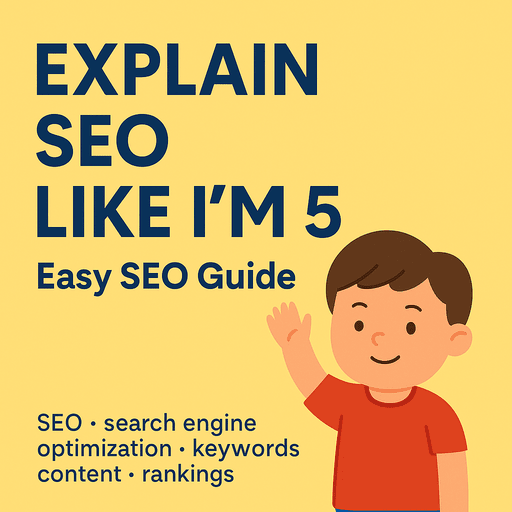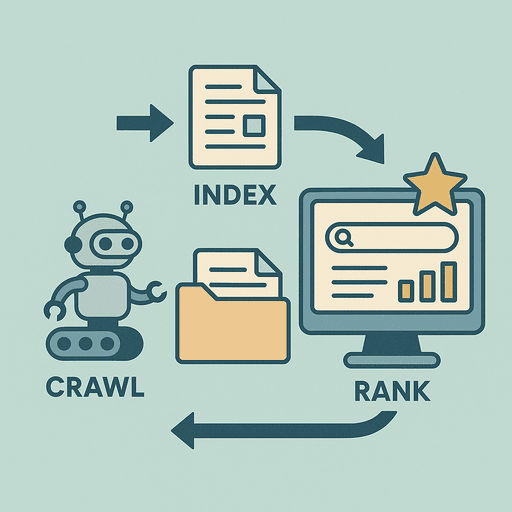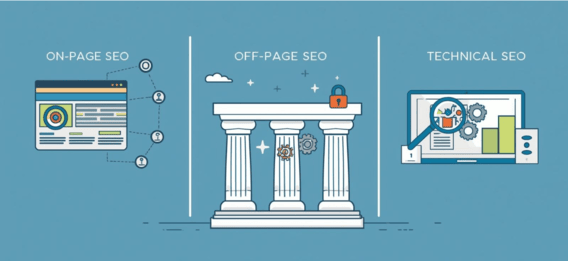Explain SEO Like I’m 5: Easy SEO Guide

Short Answer: SEO (Search Engine Optimization) is how you help Google understand your website so people can find it when they search online. Think of it like raising your hand in class. The clearer your answer, the more likely the teacher (Google) is to call on you first. With a few simple steps, you can teach search engines what your site is about and get more visitors without paying for ads.
Introduction: What SEO Really Means
Have you ever typed something into Google and wondered why certain websites appear at the top?
That’s SEO in action.
Search Engine Optimization might sound complicated, but it’s really just the process of making your website easier for both people and search engines to understand.
When you use the right words, write helpful content, and keep your pages organized, Google notices. Then, when someone searches for something related to what you offer, your site has a better chance of showing up first.
By the end of this guide, you’ll know exactly what SEO is, how it works, and how to start using it even if you’ve never done anything technical before.
Key Takeaways
-
SEO helps your website show up when people search on Google.
-
You don’t need to be an expert to start improving your rankings.
-
The secret is clarity: simple words, helpful content, and trustworthy links.
1. What Is SEO in Simple Terms?

Imagine the internet as a giant library. Every website is a book. Google’s job is to find the right book when someone asks a question.
SEO is like writing a great book title and clear labels on the cover so Google knows what’s inside.
When someone searches “best chocolate chip cookies,” Google scans millions of websites. The ones that use that phrase naturally, answer the question clearly, and have trustworthy information rise to the top. That’s how SEO helps your content get discovered. It connects what people are searching for with what you’ve created.
2. How Search Engines Actually Work

Search engines like Google use three main steps to do their job:
-
Crawl – Tiny bots explore the internet by following links from page to page.
-
Index – They store what they find in a giant digital library.
-
Rank – They decide which pages deserve to appear first for each search.
When your site is easy to read, well-organized, and trustworthy, those little bots understand it faster. That’s when Google rewards you with higher visibility.
3. The Core Pieces of SEO (Made Simple)

On-Page SEO
This is everything that happens on your own website: the words, titles, and structure.
Here’s how to make it work:
-
Use your main keyword like “easy SEO guide” in your title, headings, and a few times in your content.
-
Write clear, valuable answers to real questions people ask.
-
Add alt text to images so Google can “see” what they’re about.
Off-Page SEO
This part happens outside your website. It’s all about building credibility.
-
When other websites link to you, it signals that your content is trustworthy.
-
Getting mentioned on blogs, directories, or social media also helps search engines notice you.
Technical SEO
This is the behind-the-scenes part. It makes your website smooth and easy to use.
-
Make sure your pages load quickly.
-
Check that your site works well on phones and tablets.
-
Use secure HTTPS so visitors and Google feel safe.
Together, these three parts form the foundation of SEO. When they’re balanced, your site is easy to find, easy to read, and easy to trust.
4. Keywords: The Words That Make SEO Work
Keywords are the secret language between people and search engines.
When someone types “how to start SEO,” Google looks for pages that use similar phrases. If your article naturally includes that question, your chances of appearing go way up.
To find great keywords:
-
Use free tools like Google Keyword Planner, Ubersuggest, or AnswerThePublic.
-
Focus on long-tail keywords such as “learn SEO for beginners” instead of just “SEO.”
-
Sprinkle them throughout your article but never force them.
Think of keywords as road signs. They help guide both Google and readers exactly where to go.
5. Writing SEO Content That Feels Human
SEO writing isn’t about stuffing keywords into every sentence. It’s about helping people find what they need and enjoy reading it once they do.
Here’s how to keep your content engaging:
-
Start with empathy. Ask yourself what your reader is really looking for.
-
Write like you talk. Use simple, conversational language that feels natural.
-
Use structure. Short paragraphs, headers, and bullet points make reading easier.
-
Add examples and stories. Real-world examples help readers connect and remember.
When your content feels human, people stay longer, and that’s exactly what Google wants to see.
6. Simple SEO Tips You Can Do Today
You don’t need fancy software or a big budget to start improving your site. Try these beginner-friendly SEO tips:
-
Add your main keyword to your page title, meta description, and first paragraph.
-
Link to other pages on your site that cover related topics.
-
Use clear image names and alt text for accessibility and SEO.
-
Check your site speed on tools like PageSpeed Insights.
-
Make sure your site works well on mobile devices.
-
Keep your content fresh and update older posts every few months.
Each small improvement helps Google trust your website more, which means better rankings over time.
7. How to Measure If SEO Is Working

SEO takes time, but the results are worth it. The best way to track progress is by using Google Search Console and Google Analytics.
Here’s what to look for:
-
Traffic: Are more people visiting your site each month?
-
Keywords: Which search terms are driving clicks?
-
Engagement: How long do visitors stay on your pages?
If you see steady growth in these areas, your SEO is working. Just remember, slow and steady wins the race.
FAQ: Common Beginner Questions About SEO
Q: How long does it take to see SEO results?
A: Usually 3 to 6 months. It’s not instant, but once your site gains traction, the results last much longer than ads.
Q: Do I need to hire an expert for SEO?
A: Not right away. You can learn the basics and get great results on your own. Once you grow, you might bring in an SEO professional to refine your strategy.
Q: What’s the easiest part of SEO to start with?
A: On-page SEO, like optimizing your titles, keywords, and content. It’s simple and has a big impact.
Q: Is SEO free?
A: Yes. The only cost is your time and effort. Most helpful tools and data come straight from Google.
Conclusion: SEO Is Simpler Than It Sounds
At its core, SEO is about being helpful, clear, and consistent. You don’t need tricks or complicated software, just an understanding of how search engines think.
When you write for real people, keep your site clean and organized, and use keywords naturally, Google rewards you over time. Think of SEO as a long-term friendship with search engines. You build trust, show up often, and always try to help.
Start small, stay curious, and your website will slowly climb higher in the results because you took the time to explain what you do clearly and confidently.
Need Help Getting Found Online?
If SEO still feels confusing or you’d rather have an expert handle it, I can help. I specialize in making websites stand out in Google and AI-powered search results with clear, human-focused content strategies.
Contact me today to get personalized SEO help that actually works — no jargon, just real results.

0 Comments Add a Comment?